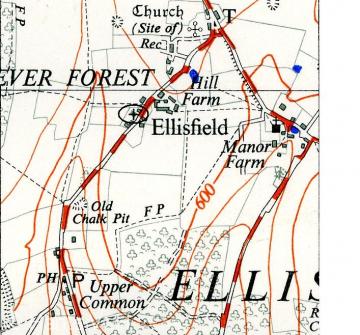The Congregational Cause in the Parish of Ellisfield

In a similar manner to the Congregational cause in the neighbouring parish of Farleigh Wallop that in Ellisfield started with meetings being held in a cottage. These appear to date from the early 1890s. Likewise the cause was supported by the members of London Street Congregational Church in Basingstoke.
During the early years of the twentieth century there was a service every Sunday and Thursday, with an undoubtedly encouraging feature being ‘the attendance of so many young people, including young farm labourers.’ There was also a Sunday School and a Mothers’ Sewing Class. Regular services were supplemented with gatherings for special events on Good Fridays and at harvest time. At the harvest thanksgiving service in 1912 the observation was made that Ellisfield ‘stands badly in need of a chapel’.
This need was met in the following year, thanks to financial assistance from Miss Sarah Jane Wallis, who had been instrumental in building the chapel in Farleigh Wallop. The simple wooden building was capable of accommodating about a hundred persons and by means of subscriptions the members of the congregation furnished it with seats and an American organ. While gifts presented by various friends included a Bible for the reading desk and a lamp. The chapel was situated on a road, known as Green Lane, nearly opposite Hill Farm.
During the 1920s and 1930s it appears to have been well used and in 1931 it acquired the organ from Winslade when that chapel was closed. Due to its attractive location and the warm welcome they received, Ellisfield was a popular destination for Congregationalists from Basingstoke. Moreover, notwithstanding the difficulties associated with its relatively remote location, services carried on throughout the Second World War. Closer relations were also forged with the Anglican Parish Church of St Martin’s. In 1943, a united harvest festival was held in the chapel. The service was conducted by the Congregational minister from London Street, Rev. Wilfrid Salmon, while the preacher was the Rector of Ellisfield, Rev. Angus R.H. Mackay. The previous Sunday evening the chapel had been closed and the chapel-goers had joined in the Harvest service at the Parish Church.
Once the War was over, services continued to be held each Sunday, with some of the most appreciated being those led by members of the London Street Youth Fellowship. However, declining congregations meant that in the autumn of 1949 the London Street deacons reluctantly decided to recommend the chapel’s closure. Fittingly for such a rural setting, the last service was the harvest festival celebration in October 1949. In keeping with the previously mentioned spirit of Christian unity, a letter was written by the deacons to the Rector asking him to get in touch with all those who had formerly attended the chapel. Presumably this was to enable him to ascertain and respond appropriately to their spiritual needs.
Following the chapel’s closure, the seats and organ were removed and sold along with the building. It is not clear who bought the premises or to what use, if any, they were put during the 1950s, but in the 1960s the chapel, which had been for many years such a valuable facility for the parish was demolished and on the site a property known as Fox Hill House was built.
(quotations from Hants and Berks Gazette)
Roger Ottewill
December 2015
Content derived from research undertaken as part of the Victoria County History project


